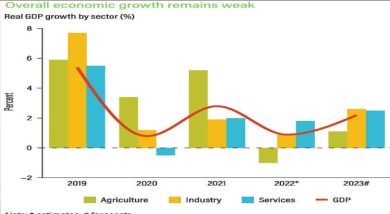Malawi set to benefit from AfDB debt plan
Malawi is set to benefit from the African Debt Managers Initiative Network, a new programme to provide home-grown solutions to Africa’s debt challenges championed by the African Development Bank’s (AfDB) African Development Institute.
Launched last week, the initiative also seeks to strengthen the debt management capacity of African countries and institutions.
In a statement, African Development Institute director Eric Ogunleye observed that the growing financing needs

for infrastructure development, poverty reduction, mitigating climate change and tackling insecurity are driving African
countries to increase their borrowing, further escalating debt vulnerability.
He said: “There is, therefore, a growing need to strengthen debt management capacity in African countries.”
Ogunleye said the high-cost debt imposes a significant burden of debt servicing on African countries, averaging 18 percent of total government revenue.
A recent International Monetary Fund (IMF) and World Bank debt assessment showed that Malawi, Ghana, Congo Republic, Sudan, Zambia and Zimbabwe were in debt distress The African Development Institute said one of the factors driving debt accumulation across Africa over the past decade has been the shift by countries towards costly commercial debt, with a larger share now owed to external bondholders and creditors outside the Paris Club.
In Malawi, the debt crisis is taking its toll on public spending with the country’s real public spending per person (excluding intere s t payments) expected to fall by 32 percent between 2022 and 2026, according to Christian Aid, a United Kingdom charity.
This is happening at a time Malawi is yet to reach an agreement with high interest lenders and government creditors for a possible debt restructuring, which commentators hope could free up resources for the social sector.
In November last year, IMF urged the Malawi government to prioritise debt restructuring, a shift to private-led sector growth and price stabilisation to anchor the $175 million four-year Extended Credit Facility programme.
Scotland – based economist Velli Nyirongo said in an interview yesterday that at this juncture, debt restructuring could provide short-term relief and enhance fiscal space, thereby promoting economic growth and stability.
He said: “However, this is not a panacea on its on. For debt restructuring to be truly effective, it must be part of a broader strategy that includes sound fiscal management, economic diversification, and structural reforms.
“It is crucial that the debt restructuring process progresses swiftly, as any delay exacerbates fiscal pressures and impedes the government’s ability to invest in growth-enhancing sectors. Thus, a timely and effective restructuring is essential for Malawi’s economic recovery and development.”
Treasury officials were to respond to our questions, but Secretary to the Treasury Betchani Tchereni earlier said Malawi is making big progress on debt restructuring





